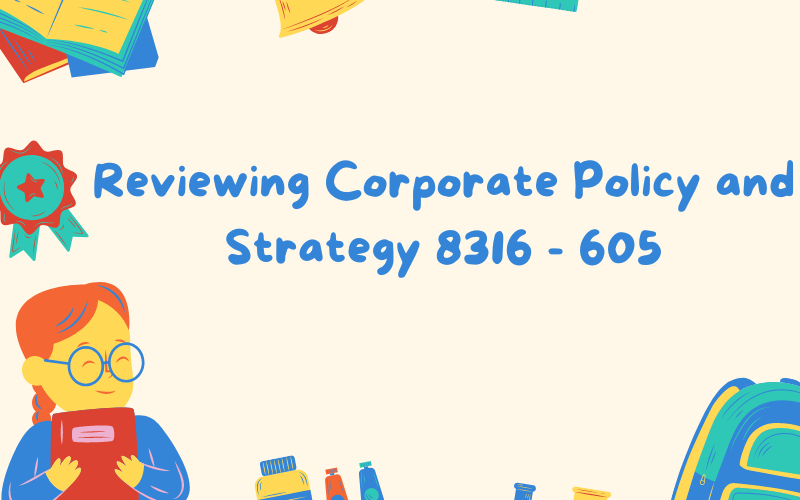About This Unit
When it comes to fulfilling the prerequisites for earning a degree from the Institute of Leadership and Management (ILM), this Unit despite being optional represents a key step toward reaching that goal. This unit is designed to develop learners’ appreciation of the role and significance of policy and strategy in enabling the organisation to achieve its goals and live up to its values, and to be able to assess the effectiveness of the processes of policy and strategy development. Upon completion of the course, the participants will have the ability to review the procedures for the development and implementation of corporate policies and strategy as well as make informed recommendations for changes to procedures for the development and implementation of corporate policy and strategy.
What you will learn
This course is designed to give aspiring and current upper-level managers a solid grounding in the intricacies of managing a business. The learner will get an understanding of the how to effectively review, identify and approach these changes in a productive way, to ensure that everyone within the corporate is working toward the same goal. This course will as well develop learners’ appreciation of the role and significance of policy and strategy in enabling the organisation to achieve its goals and live up to its values, and to be able to assess the effectiveness of the processes of policy and strategy development. Which will in-turn improve the effectiveness of their projects and help them see why strategically combining these resources is crucial to the success of any business. In addition, students will gain an understanding of the importance of stakeholders in different organisations, their interests, roles and relationships to the organisation and impact on its goals and values, policies and plans. Learners will then be able to accumulate and use the best practice in the development of policies and strategy, providing their organization with a lasting competitive edge. The student will gain a deeper knowledge on how to best negotiate and discuss skills, as a result the student will develop the knowledge to make a persuasive argument for implementing new strategies for managing and making better use of the management’s policies.
This unit is suitable for persons who
This unit is geared for both newly promoted senior managers and middle managers looking to advance their careers. It is also suitable for students working toward senior management positions who are aim to develop their capacity for critical analysis and self-reflection. It is useful for l earners who wish to advance from Level 5 to Level 7 who can do so with the help of this stepping stone because credits can be transferred. For the ILM Level 7 Certificate or Diploma in Executive Management, for instance, students can transfer 12 credits, while for the ILM Level 7 Certificate or Diploma in Strategic Leadership, students can transfer 6 credits. It’s perfect for anyone hoping to get insight into what it takes to be a senior management, as well as for those who want to take an objective look at how they’ve performed thus far. In addition to helping employees, this is useful for companies that wish to prepare their top executives for future roles and give aspiring top-level managers a means of self-evaluation.
Learning outcomes
After completing this unit, learners will be able to meet two main learning outcomes as shown below. These outcomes are further divided into a number of sub-divisions. The learning outcomes will enable them to;
- Review the procedures for the development and implementation of corporate policies and strategy.
- Make recommendations for changes to procedures for the development and implementation of corporate policy and strategy.
What are the entry requirements?
This certification is available at three different levels: an introductory Award, an intermediate Certificate, and an advanced Diploma. This credential is broken down into smaller pieces called “units,” and each unit is meant to impart a specific body of information or expertise. Students advance in knowledge and competence as they progress through ILM’s six levels. Before being accepted to level 6, the student should have a substantial amount of credits across multiple types of level 5 certifications. To qualify for an award, a candidate, for instance, must take 6 of the 12 required credits, as well as participate in at least 1 hour of orientation and 3 hours of tutorial support. A minimum of 13 credits, including an introductory session and tutorials totalling at least 3 contact hours, must be completed in order to receive a certificate. As a last step toward graduation, students need to earn 37 credits, sit through a two-hour orientation, and complete seven hours of tutoring. Credits earned at Level 5 can be carried over to Level 6. However, these eligibility standards are set by legal frameworks. They roughly correspond to managerial levels. They also serve to draw attention to the difficulty of a certification process. Because of this, although while the majority of ILM credentials are vocational in nature and the levels correspond to certain educational instruction, you may need to either skip a level or start at a lower level than you are currently at if you wish to advance in your academic career. One could have a bachelor’s degree in economics, but no experience managing a project or leading a team, necessitating a slower-level vocational certificate even though level 6 is equivalent to the third year of an undergraduate degree.
How we can help
The ILM study process can be challenging and time-consuming, taking away from your ability to participate in other academic and social activities. In the event that you are in need of assistance with an ILM project, you can rely on us to put you in touch with skilled expert writers that are familiar with the subject matter. They will ensure that you comprehend everything that is required in order to achieve the grades you seek. We’ll see to it that the task gets done so that you may focus on attending to the other concerns at hand. Our primary objective is to provide students with a useful resource that can assist them in achieving their academic and professional objectives. Our experts put in the extra effort and time required to perform exhaustive research for your Optimising Organisational Capacity assignments so that you can be certain you will receive the marks you desire. In addition, if you want assistance with your ILM assignments, we will provide you with the essential study resources to help you comprehend fundamental ILM concepts. There will be moments when the task at hand is just too difficult for you to deal with. This indicates that there are still some ILM ideas that you do not fully understand. You need not worry about your grades because we are here to assist. You can rest assured your ILM tasks will be tackled by experts in the field who have years of experience and a solid understanding of each concept. If you employ our service, you can be assured that you will achieve results you seek, which will save you a significant amount of money on retakes. In addition, we make certain that each and every task is finished on time. Regardless of the deadline, we can assure you that we will deliver in a timely fashion, averting any penalties involved.
Furthermore, the standard of your project will not suffer in the event that we are given a request at the eleventh hour. Also, we have a stringent policy against plagiarism, hence we always deliver original content that is one hundred per cent unique to each of our customers. Before delivering any work to you, we make certain that our ILM assignment help experts put them through a range of plagiarism detection software to verify that they are original. We would never tolerate a situation in which one of our customers is accused of plagiarizing his or her work and faced repercussions from the educational institution. The provision of a channel that contributes to the academic development of students is the main goal for us. Therefore, we only engage individuals who have substantial prior experience working within the ILM curriculum; consequently, you will have the peace of mind that comes along with knowing that your study will be meticulously documented. No matter what level of the ILM you are working on, our writers will utilize their extensive expertise as well as their thorough knowledge of the subject area to satisfy the requirements and standards of your tasks.
We understand that Students typically have limited financial resources at their disposal. Hence, we strive to provide price plans that are as adaptable as possible to fit a variety of budgets. Because we want students of all different socioeconomic backgrounds to be able to make use of our services, the prices that we charge for providing assistance with ILM assignments are kept to a minimum. If you are unhappy with the finished output, the ILM assignment help writers are at your disposal to revise the project at no additional cost to you. In addition, we provide editing and proofreading services, and we are more than happy to evaluate your work and make any necessary corrections. If you have any questions, do not hesitate to give us a call or send us an email. At any moment of the day or night, our customer service team is available to answer any queries you may have regarding the management and leadership assignments you have been assigned. We are eager to be of assistance to you.
Resources used for the unit
There are various publications that are provided for learners wanting to pursue this unit. The following are a few of them that are widely used by institutions all over the world.
Engert, S., & Baumgartner, R. J. (2016). Corporate sustainability strategy–bridging the gap between formulation and implementation. Journal of cleaner production, 113, 822-834.
Daft, R. L., & Macintosh, N. B. (1984). The nature and use of formal control systems for management control and strategy implementation. Journal of management, 10(1), 43-66.
Ogbonna, E., & Harris, L. C. (2003). Innovative organizational structures and performance: A case study of structural transformation to “groovy community centres”. Journal of Organizational Change Management.
Orna, E. (2017). Information strategy in practice. Routledge.
Pearce, J. A., & David, F. (1987). Corporate mission statements: The bottom line. Academy of Management Perspectives, 1(2), 109-115.
Pors, N. O. (2008). Management tools, organisational culture and leadership: an explorative study. Performance Measurement and Metrics.
Savage, G. T., Nix, T. W., Whitehead, C. J., & Blair, J. D. (1991). Strategies for assessing and managing organizational stakeholders. Academy of management perspectives, 5(2), 61-75.
Schein, E. H. (2010). Organizational culture and leadership (Vol. 2). John Wiley & Sons.
Steiner, G. A., Miner, J. B., & Gray, E. R. (1977). Management policy and strategy (Vol. 1). New York: Macmillan.
Varvasovszky, Z., & Brugha, R. (2000). A stakeholder analysis. Health policy and planning, 15(3), 338-345.





